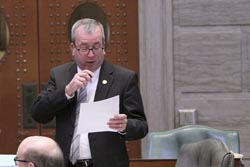 Website | E-Mail Me | Biography | Newsroom | Subscribe | Unsubscribe |
|||
| August Keaveny Connection | Contact: Stacy Morse — (573) 751-3599 | ||
| Governor Signs Several of Sen. Keaveny's Bills | |||
Allowing Mistakes to Be Fixed in Child Support Orders My first bill to receive approval from the governor’s pen was SB 69, which is designed to improve productivity and eliminate the arduous process when dealing with mistakes found in administrative child support orders. My bill grants authority to administrative hearing officers from the Missouri Department of Social Services (DSS) to set aside or correct administrative child support decisions or orders and proposed administrative modifications of an order. Although the errors addressed in SB 69 do not come up often in child support cases — during FY 2011, DSS issued 11,863 child support decisions, and only 111 scrivener’s errors were found in that timeframe — the bill will help eliminate unnecessary steps in the process of correcting mistakes. By allowing officials to fix errors themselves, those professionals can get their work accomplished in a more timely manner and prevent cases from backing up in the courts. Modifying Bankruptcy Proceedings to Protect Certain Health Care Savings On July 2, the governor signed SB 100, which is an omnibus bill that addresses various state programs and the judicial system. The heart of the bill helps increase protections for Missourians involved in bankruptcy proceedings and keeps certain funds safe for health-related purposes. Under current state law, an individual who is forced to declare bankruptcy can exempt his or her money located in a retirement or a profit-sharing plan from creditors. Senate Bill 100 expands those exemptions to include money a Missourian has accumulated in a health savings plan or received from an inherited individual retirement account (IRA). Appointing Public Administrators and Allowing the Printing of Missouri's "Blue Book" The governor gave his executive approval on July 5 to SB 99 — legislation that addresses Missouri’s governmental structure and elections. When initially drafted, this bill started out with a single provision relating to the election of public administrators within the City of St. Louis. When this bill takes effect, a majority of the circuit judges and associate circuit judges of the 22nd Judicial Circuit Court will be responsible for appointing the public administrator for the City of St. Louis. The bill also gives the Secretary of State the authority to enter into an agreement with a nonprofit organization to once again print copies of Missouri’s official state manual, also known as the “Blue Book.” This publication features information about local, state and federal governments, in addition to stories, essays and pictures that help preserve Missouri’s heritage. A few years ago, the Legislature decided to only publish the Blue Book online; however, this prohibited a segment of our state’s population from accessing this important information. Now the people have the chance to receive valuable information about our state and its services. Other provisions found in SB 99 address the charging of taxes on certain motor vehicles, trailers, boats and outboard motors and allow citizens to vote on whether to remove the application of the local sales to the titling of these types of vehicles and equipment. The bill also allows certain third class cities to eliminate, by ordinance or order, primary elections for mayor and councilmen offices. Potential candidates for these offices would have to file a statement of candidacy with the clerk in order to be placed on the ballot. Please feel free to visit my Missouri Senate website at www.senate.mo.gov/keaveny to learn more about these and other bills I sponsored throughout the 2013 legislative session. |
|||
| Veto Session Begins in September | |||
Only the primary sponsor of a bill can make the motion to override the governor’s veto. If the bill receives a veto override in its originating chamber, the primary handler of that legislation in the other chamber may take it up for veto override consideration. Both chambers must vote to override a veto by a two-thirds constitutional majority. One of the bills passed during the 2013 legislative session was HB 253, which would have dramatically increased tax burdens on Missouri citizens. I firmly opposed the legislation and was glad that it received a red X by the governor (click here to read the governor's veto letter of HB 253). I'm hoping the Missouri Legislature does not attempt to override the veto. House Bill 253 was conceived as a way to compete with Kansas for the lowest income taxes. It's estimated that the bill would reduce state revenue by $500 to $800 million when fully implemented. To enact tax cuts when our state's foundation formula — Missouri's mechanism to fund elementary and secondary schools — is underfunded is poor policy. Our children's education should not be bartered for lower income taxes. Without quality education, the people who make up our state's workforce will lack the necessary skills to help grow our economy. In addition, the governor announced on June 28 that he is restricting $400 million from the FY 2014 budget, due to several lawmakers' intent to override the veto of HB 253. The governor is quoted in an executive press release saying, "House Bill 253 is a fiscally irresponsible, ill-conceived experiment that would undermine Missouri's strong fiscal foundation and weaken our economy now, and for years to come. With a price tag of at least $800 million, House Bill 253 contains flawed provisions that would explode these costs immediately — to the tune of $1.2 billion — if Washington passes the Federal Marketplace Fairness Act." Recently, I voiced my concerns alongside the governor at a news conference in Clayton, Mo., and stressed the negative consequences that would occur in Missouri if a veto override occurs. An override would have a devastating snowball effect on our economy. With a large hole in our state's revenue caused by HB 253, other state services would suffer because of funding cuts. I will stand firm in my opposition to HB 253 and remain supportive of the governor's veto. |
|||
| Medicaid Transformation Committee Studies Missouri Health Care | |||
Expanding our state’s Medicaid program, also known as MO HealthNet, is a strong priority and was an objective I fought heavily for throughout the 2013 legislative session. This program serves our neighbors who are most in need of access to health care, including low-income individuals, children, pregnant women, individuals with disabilities, and senior citizens. I was extremely disappointed when the Senate majority party refused to move forward in expanding this valuable program. Some of the main goals behind the committee are to develop methods to help prevent fraud and abuse in the MO HealthNet system and find more efficient and cost-effective ways to provide coverage for MO HealthNet participants. The panel is charged with issuing a report of recommendations to the General Assembly by Dec. 15. To learn more about the panel, including its schedule and hearing dates, please visit www.senate.mo.gov/MedicaidTransformation. |
|||
| Education News in Missouri | |||
The Missouri Department of Elementary and Secondary Education announced that it is issuing help to Missouri school districts following the recent Breitenfeld v. School District of Clayton ruling by the Missouri Supreme Court. The guidance document — updated on July 10 — will provide districts assistance with managing requests from parents for student transfers from unaccredited to accredited districts. On June 11, the Missouri Supreme Court upheld a state law that allows students to transfer out of unaccredited school districts. The court stated that the state law does not violate the Hancock Amendment, which prohibits governments from implementing new costs without providing the means in which to pay for them. Mo. Rev. Stat. § 167.131 provides, in part, that an unaccredited school district shall pay the tuition for students to attend a school in another accredited district of the same or an adjoining county. The two unaccredited school districts in St. Louis County are Normandy and Riverview Gardens school districts. Students can choose to transfer to any accredited district in St. Louis County, St. Charles County, Franklin County, Jefferson County, or St. Louis City. Interim Committee on Education to Tour Missouri The Missouri House Interim Education Committee recently announced that it will tour Missouri after the Legislature's veto session in September. Among issues the panel may discuss include early education, student transfers, and under-performing school districts. The first hearings will take place on Monday, Sept. 23 — the first at 2:00 p.m. at St. Charles Community College in St. Charles, Mo., and the second at 7:00 p.m. at Webster University in St. Louis. Click here to read a Missouri Times article featuring more information about the committee and its hearing schedule this fall. You can also view the committee's official website by visiting the "Committees" tab on the Missouri House website (www.house.mo.gov). |
|||
| Preventing Medicaid Fraud | |||
Medicaid providers include doctors, dentists, nursing homes, clinics, and any other individual or company that is paid by the Medicaid program. If a provider intentionally misrepresents the services rendered, and therefore increases the reimbursement from Missouri Medicaid, provider fraud has occurred. The following are examples of Medicaid fraud (provided by the Missouri Attorney General's website):
There are several ways you can report provider fraud and neglect:
|
|||
| Importance of Tourism in Missouri | |||
|
|||
| Outdoor and Conservation Events in St. Louis | |||
Several of the events hosted by the garden are included in your general admission price, which is $8 for adults (ages 13 and older) and free for children. Here are some fun festivities that will take place throughout August. You can view a full calendar and additional events by clicking here or visiting www.missouribotanicalgarden.org.
|
|||
| Back to School Sales Tax Holiday | |||
Back-to-school supplies that are tax exempt during this holiday include:
|
|||
 |
|||







